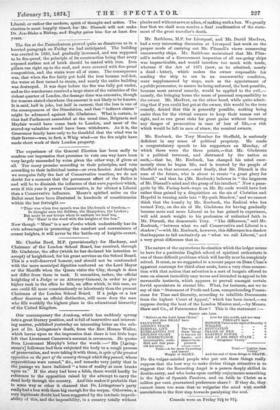Mr. Rathbone, M.P. for Liverpool, and Mr. David Maclver, had
a very interesting discussion at Liverpool last week on the proper mode of- carrying out Mr. Plimsoll's views concerning unseaworthy ships. Mr. Rathbone maintained that Mr. Plim- soll's notion of a Government inspection of all sea-going ships was impracticable, and would interfere too much with trade, whereas if the Act of 1871 (now, as he admitted, nearly a dead - letter), which makes the owner responsible for sending the ship to sea in an unseaworthy condition, were supplemented by steps, such as the appointment of a public prosecutor, to ensure its being enforced, the best possible, because most natural remedy, would be applied to the evil,— namely, the bringing home the sense of personal responsibility to the owner. Mr. MaeIver, on the other hand, while quite admit- ting that if you could but get at the owner, this would be the true remedy, denied that this is generally possible, nothing being easier than for the virtual owners to keep their names out of sight, and so run great risks for great gains without incurring any danger of prosecution in case of loss of life,—a risk which would be left to men of straw, the nominal owners.


































 Previous page
Previous page